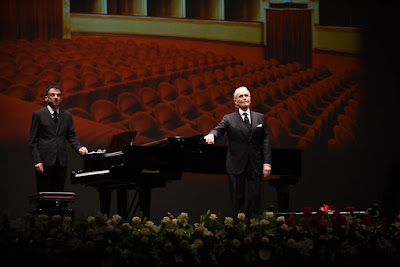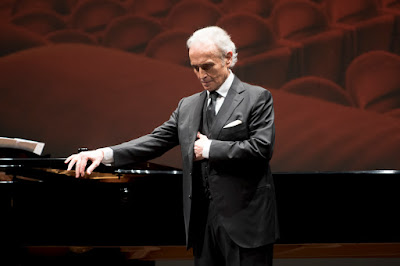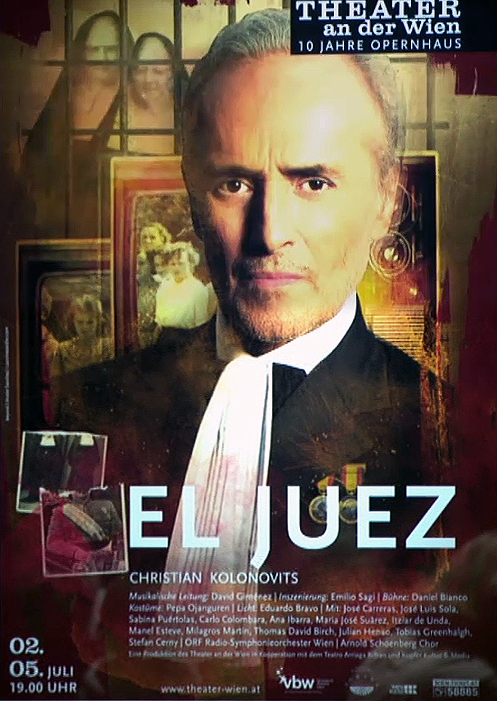Durante la conferenza stampa di ieri, cui hanno partecipato numerosi giornalisti, il tenore si è detto molto felice di esibirsi per la prima volta a Hermosillo, nello specifico nella cornice del Festival del Pitic, accompagnato da artisti fantastici, e di fare ritorno in Messico.
Ancora una volta, sembra prendere le distanze dall'etichetta "Final World Tour" che appare nelle locandine dei suoi concerti, che reputa più affine agli artisti di musica pop: ribadisce quindi la sua intenzione di proseguire per almeno due o tre anni con una serie di concerti che lo riporteranno nei luoghi nei quali si è esibito nei suoi 46 anni di carriera.
Cantare in un posto nuovo è sempre una nuova sfida per un artista, così come lo è poterlo fare davanti a un pubblico più eterogeneo e poco abituato al genere più classico. Per Carreras si tratta quindi di una doppia soddisfazione, ben contento di contribuire a contrastare il cliché che ha inquadrato a lungo la musica classica e operistica come genere elitario.
Per l'occasione, ha messo a punto un programma molto vario, contenente qualcosa di classico, della tradizione napoletana e di zarzuela, ma anche qualcosa di Manzanero, sempre con la dovuta modestia, senza rinunciare ad esaudire eventuali richieste nel limite del possibile: ironicamente sostiene di poter sempre ricorrere alla scusa che "l'orchestra non ha lo spartito".
Come ha già affermato in altre occasioni, l'uomo e l'artista camminano parallelamente, per tanto è possibile che le esperienze di vita dell'uomo condizionino la profondità interpretazione dell'artista. Tuttavia, rimane convinto del fatto che, per quanto la vita possa insegnare, così come gli anni, le persone spesso inciampano in alcuni degli stessi errori, rimanendo sempre uguali a sé stessi.
Tra i tenori della generazione attuale, a suo modo di vedere, di sicuro non mancano talenti eccezionali, ma sarebbe ingiusto menzionare alcuni nomi a discapito di altri. Tuttavia, talento e coraggio non sono sufficienti: per costituire un nuovo trio come lo sono stati Carreras, Domingo e Pavarotti per oltre 10 anni, bisogna che tre tenori siano disposti a cantare insieme.
In conclusione, su invito ad esprimere un'opinione sul brillante tenore messicano, Javier Camarena, Carreras rievoca un gala di due anni fa a Salisburgo cui hanno preso parte diversi artisti: in quell'occasione ha avuto modo di appurare dal vivo il suo talento, che lo sta portando adesso ad avere uno straordinario successo a New York con I Puritani: un tenore dotato di grande estensione e musicalità, di bel timbro, ma anche una bella persona cui augura un futuro grandioso.
Oltre alla conferenza stampa, circolano in rete foto che ritraggono la visita del tenore presso l'Hospital Infantil di Sonora, durante la quale si è trattenuto con alcuni dei piccoli pazienti e le loro famiglie dando loro il conforto di qualcuno che ha superato un'esperienza simile.
![]() |
| Festival del Pitic (Twitter) |
http://www.televisahermosillo.tv/
Infine, segnalo un'ulteriore intervista esclusiva per EL IMPARCIAL. Carreras ha accennato fortuna di essere stato consapevole fin dall'infanzia di cosa avrebbe voluto diventare e che questo si sia realizzato, avendo avuto la possibilità di cantare per tanto tempo davanti a tantissima gente. Al riconoscimento quale una delle voci più prestigiose di sempre corrisponde la gratitudine nei confronti di chi la pensa in questo modo, di tutti coloro che assistono ai suoi concerti e che lo seguono da tanti anni o anche da poco tempo.
Di Elena Rivera, il soprano che lo accompagnerà questa sera, ha esaltato la voce magnifica e soprattutto la musicalità, appellandosi a ciò che era solito affermare Pietro Mascagni, secondo il quale per cantare bisognava avere anche una bella voce, ma erano necessarie altre qualità. A questo si aggiunga la carriera internazionale che la giovane sta conducendo, partecipando a produzioni importanti in Europa, oltre al fatto importante di essere nativa di Hermosillo.
Tra i premi ricevuti non può sceglierne nessuno, perché ognuno è donato con il cuore ed è il più importante in un dato momento. Benché un interprete non è mai il miglior giudice di sé stesso, sarebbe molto difficile scegliere la migliore recita o il migliore concerto in 46 anni di carriera: tuttavia ricorda una serie di concerti e recite memorabili presso palchi prestigiosi quali il Teatro alla Scala o il MET, come all'Opera di Vienna o al Covent Garden di Londra, consapevole della fortuna di essere stato sempre bene in concomitanza con i debutti importanti. Spera comunque che il meglio debba ancora venire.
Facendo riferimento alla cultura messicana, in parte sorella di quella spagnola anche grazie alla lingua, Carreras sa che non bisogna parlare solo di musica, ma anche di altre forme d'arte: per quanto riguarda la musica, sono tanti i cantanti d'opera come quelli popolari, di rancheras come Fernández, un genere che apprezza molto e i cui interpreti posseggono voci stupende.
L'appuntamento è dunque per questa sera presso Plaza Alonso Vidal. Josep Carreras offrirà un concerto gratuito accompagnato dal soprano Elena Rivera e le orchestre Filarmonica di Sonora e la Camerata di Cohahuila.
In bocca al lupo, Josep!
ENGLISH:
Josep Carreras arrived in Hermosillo, Mexico, between Monday and Tuesday, on occasion of his free concert which will inaugurate the Festival of Pitic 2016 "Hermosillo con su gente", which will take place this evening at the Plaza Alonso Vidal.
During Tuesday's press conference, which was attended by several journalists, the tenor said he was very happy to perform for the first time in Hermosillo, especially within the framework of the Pitic Festival, accompanied by fantastic artists, and to return to Mexico once again as well.
Once again, he seemed to distance himself from the label "Final World Tour" standing out in his concert posters, which it considers more akin to pop music artists: therefore he reaffirms his intention to continue for at least two or three years with a series of concerts that bring him back to the places where he has performed throughout his 46-year career.
Singing in a new place is always a new challenge for an artist, just as it is to do so in front of a heterogenous audience, not really familiar with classical music. Therefore it is a double satisfaction to him, being very happy to contribute against the cliché which have called classical music and opera "elitist".
For the occasion, he has chosen a varied program containing something classic, traditional Neapolitan and zarzuela, but he is also going to pick up something by Armando Manzanero with due modesty. He will even try to satisfy requests from the audience to some extent: "We have always excuse that the orchestra does not have the score", he ironically said.
As he had already stated on other occasions, the man and the artist walk side by side, so it is possible that the man's life experience conditions the artist's interpretation. However, he remains convinced of the fact that, no matter how much life can teach you, as well as years, people often make some of the same mistakes, remaining always equal to themselves.
Among the tenors of the current generation, in his view, for sure there are exceptional talents, but it would be unfair to mention a few and not others. However, talent is not enough to form a new trio as Carreras, Domingo and Pavarotti have been for over 10 years: you need three tenors who are willing to sing along.
In conclusion, since he was asked for an opinion on the brilliant Mexican tenor Javier Camarena, he recalled a Rossini gala in Salzburg, 2014, attended by several artists: on that occasion he was able to ascertain live Camarena's talent, which makes him being hugely successful in New York with I Puritani: a tenor with great extension and musicality, of beautiful timbre, but also a beautiful person whom he wishes an amazing future.
In addition to the press conference, there are a few photos on Twitter of the tenor's visit at the Sonora Pediatric Hospital, during which he met some of the young patients and their families in order to give them the comfort of someone who experienced the same and overcame it.
Finally, there is an exclusive interview for El Imparcial. Carreras pointed put how lucky he was for being aware of what he wanted to be since he was a young boy, and that he was able to achieve it and have the chance to sing for many, many people for such a long time. He feels gratitude towards all those who regard him as one of the most prestigious voices ever, both all those who attend his concerts and have followed him for many years and for a short time as well.
Of Elena Rivera, the invited soprano of tonight, he praised the magnificent voice and especially the musicality, by appealing to what Pietro Mascagni used to say, "you need also a good voice to sing", but actually other qualities are necessary. In addition to that, her international career, her role in major productions in Europe, and the fact that she is from Hermosillo.
Among the received awards he cannot choose because everyone is the most important at any given time, and is given wholeheartedly. Although an interpreter is never the best judge of himself, it would be very difficult to choose the best performance in 46 years: however, he can think of a series of concerts and memorable performances at prestigious stages such as the Teatro alla Scala or the Met, Vienna State Opera or Covent Garden in London, being well aware of having always felt fine in his important debuts.
Referring to Mexican culture, in part sister of the Spanish one due to a common language, Carreras knows that one cannot not speak only of music but also other types of art: as far as the music is concerned, he can think of many important opera as well as popular singers, rancheras singers (like Fernández), a kind of music he really appreciates and whose interpreters do really have wonderful voices.
The appointment is for tonight at Plaza Alonso Vidal. Josep Carreras will offer a free concert accompanied by the soprano Elena Rivera and the Philharmonic Orchestra of Sonora and Cohahuila Camerata.






















































